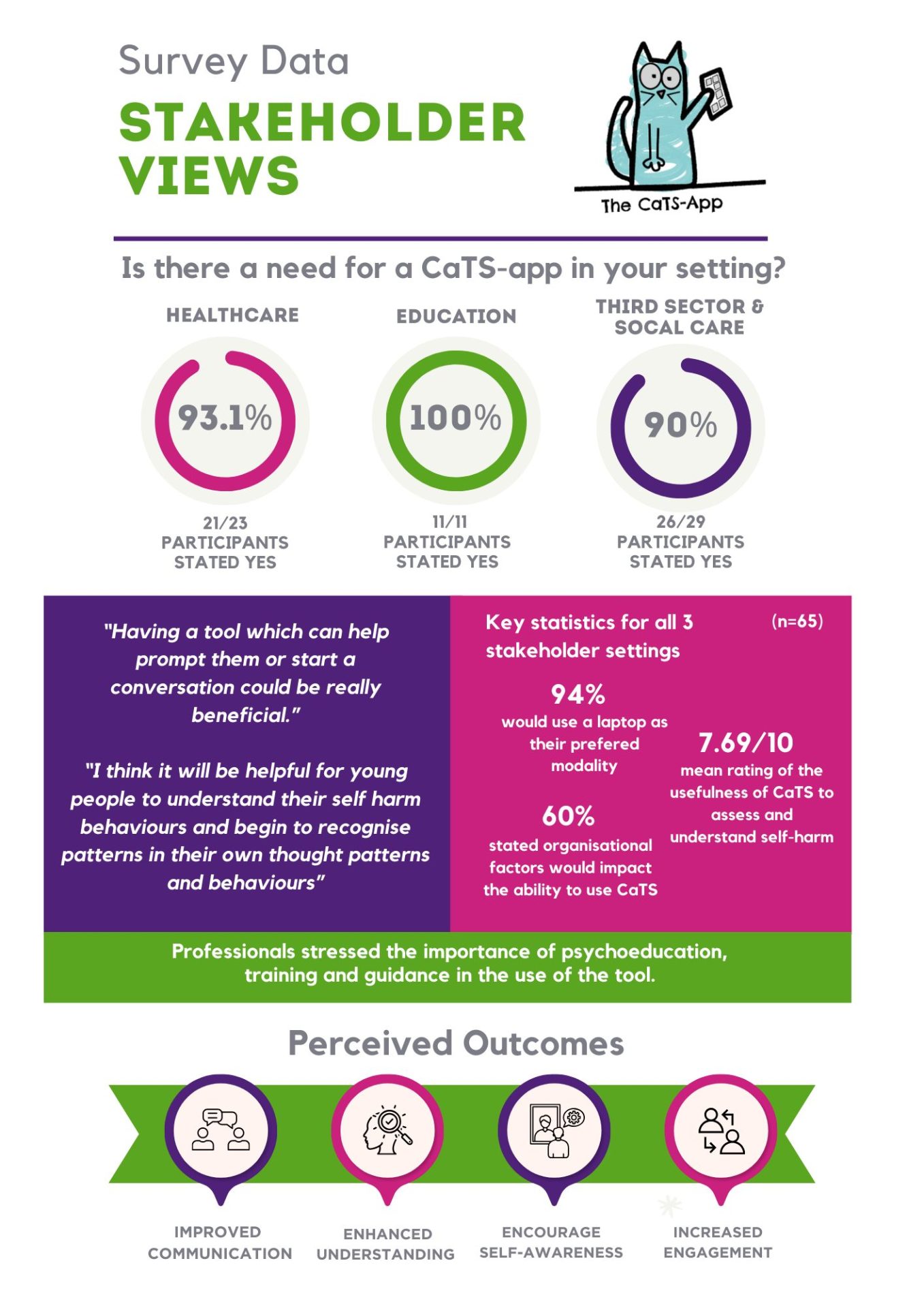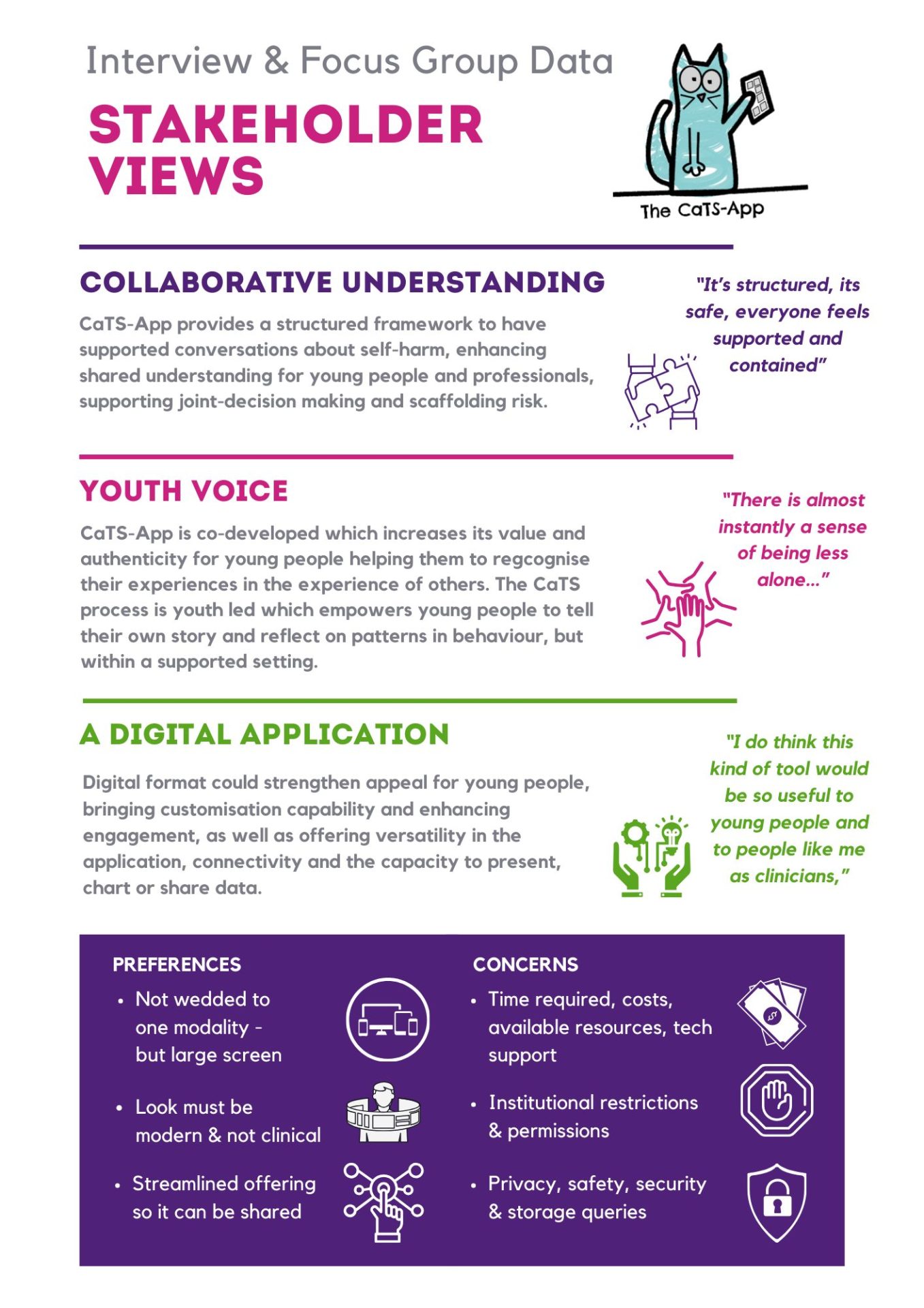Our researchers
Jo Lockwood (University of Nottingham), Camilla Babbage (University of Nottingham), Chris Greenhalgh (University of Nottingham), Marina Jirotka (Oxford University), Ellen Townsend (University of Nottingham), Lily Roberts (University of Nottingham)
Self-harm is a complex behaviour and we still have much to learn about it. There are many different factors that interact and evolve over time that may lead a young person to self-harm. There are not currently many evidence-based interventions to support young people who self-harm and most have not been co-developed with young people.
The card sort task for self-harm (CaTS)
CaTS helps young people tell the story of their self-harm journey by mapping the thoughts, feelings and events involved in a self-harm episode. A timeline is set out with multiple timepoints starting from 6 months prior to self-harm and ending after self-harm. Young people are provided with a bank of cards grouped into thoughts and feelings, events, behaviours, services and support, afterwards. Young people choose cards with items relevant to their experience of a self-harm episode at and arrange the cards along the timeline.
Our latest videos
Video 1: Why Use the CaTS-App?
Video 2: Deeper Dive & Demo into the CaTS-App
Work completed so far
Phase 1: Planning and Preparation – understanding attitudes towards CaTS
Supported by Sprouting Minds we have consulted with young people and frontline professionals across healthcare, education, social care and the third sector to understand key stakeholder thoughts about CaTS and a new digital version (CaTS-App).
We have done this by conducting an online survey, individual interviews, focus groups and workshops with professionals and frontline staff across different settings.
We have also conducted a series of three online and face to face co-production workshops with young people aged 17-24 years with lived experience of self-harm. Together we explored how the CaTS–App should look, feel and how best to use the tool.
Key findings from this work are detailed here:
Phase 2: Design and Development – to co-develop a working prototype of the app
The second stage of the project turned the thoughts and insights from key stakeholders in Phase 1 into prototype development of the CaTS-App.
During Summer 2024, we ran a series of three follow-up co-production workshops with our young people to co-create a working prototype.
Over the past year we have worked closely with our partners in Computer Science to talk through and develop our ideas into a working prototype.
Our Latest Reports:
Phase 1: Planning and Discovery
Please see below for our first report, which pulls together our first round of stakeholder and co-production work:
Phase 2: Design and Development
Please see below for our most recent report, pulling together findings from our 2024 co-production workshops with young people:
Next steps for CaTS-App
Phase 3: Feasibility
We are currently in the third stage of the project, where we plan to test and refine the prototype with key stakeholders and young people in dyad testing (one young person + one professional).
We will be conducting a small-scale research study at the start of 2026 and will use talk aloud approaches to understand how the prototype works in practice.
Partnership with young people during CaTS-App development
Co-designing our programme of work alongside our Sprouting Minds young people is an integral part of the development of CaTS-App. We have a wonderful group of young people working with us on this programme. During phase 1 our sprouts have joined us in running workshops, analysing data, checking through our final reports and sharing early findings at dissemination events. We will continue to work with sprouting minds for the next stages of the CaTS-App development.
What’s it like being a sprout on work package 8?
“My experience has been positive and meaningful. I feel proud to be part of the group, but nervous before sessions and anxious about keeping up with tasks. I think it has been a hugely positive experience, and the anxiety has made it feel more important of a role which is positive. I’ve learnt confidence in my ability to make a meaningful difference.”
Young Person
If you’re a young person and interested in joining our sprouting minds team to take part in research, please register your interest by clicking this link: Sprouting Minds Register Interest
Join us?
If you’re a professional interested in our work and would like updates about how we are progressing or if you would like to be involved in research, please register your interest at this link: CaTS Register Interest
Project partners






